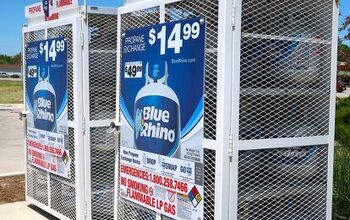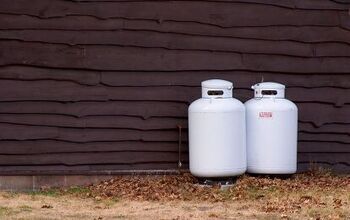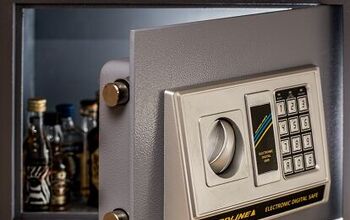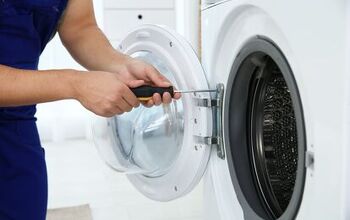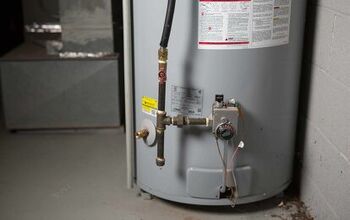Where Can I Store Extra Propane Tanks?

Many homeowners retire their propane tanks for the season when the temperatures plummet. Others simply stay stocked up on propane tanks so they always have a few extra on hand. So, where can I store extra propane tanks?
You can safely store your extra propane tanks outside on even ground away from your home and other structures. Some people store propane tanks in sheds and garages, but that’s only safe if they are empty and closed. Propane tanks last 10 to 30 years in storage when properly sealed and kept out of direct sunlight.
Never store your extra propane near heat sources and cars, as that can cause a fire. Be careful during the summer, as propane tanks become more hazardous when outside temperatures reach 120 degrees Fahrenheit. Follow along as we explore how to safely store your extra propane tanks.
Where Should I Store My Extra Propane Tank?
Ideally, you should store your extra propane tanks outside in uncovered areas. For example, it is potentially dangerous to store propane tanks under covered decks. That’s because vapors can escape a poorly sealed propane tank and ignite nearby structures when introduced to heat sources.
Place your propane tank on even ground so it doesn’t fall over or get punctured from the bottom. Never store a propane tank near cars and machinery that you plan to operate. For example, turning on a car next to a propane tank can cause the tank to ignite.
The best option is to store your propane tank somewhere in your backyard where it’s not backed up against your home. This is easier if you have a big backyard with concrete surfaces.
Can You Store Propane Tanks Inside?
You cannot store propane tanks inside as it is a severe fire hazard. Propane is highly flammable, and it can quickly ignite when introduced to a heat source. Not only can the tank catch on fire, but it can quickly spread throughout the room.
This causes fire to quickly spread throughout a structure, which causes devastating damage. Propane can also leak from a tank, and this is hard to notice until it’s too late. This gas is heavier than air, which means it’s likely to settle low to the ground.
Propane can also settle in the lowest point of a home, such as a crawlspace or basement. That means that a fire could easily start in the basement while you’re upstairs, and that’s dangerous. A fire caused by an indoor propane tank may not be covered by insurance. That’s because most insurance companies would consider that a preventable problem, which is rarely covered.
Can You Store A Propane Tank In A Garage?
You can only store a propane tank in a garage if there is no machinery and there are no heat sources. Never store a propane tank in a garage with a car that you use. Ideally, you should only store an empty propane tank in a garage if that’s the only place you can store one.
Storing a full propane tank in a garage can cause a gas leak. This can happen even if you turn the valve far enough to store the tank. While some people safely store their extra propane tanks in a garage, it isn’t worth the risk.
Some people even store their extra propane tanks in sheds. However, that is quite risky, especially if the tank is full when you put it in the shed. You can safely store an empty propane tank in a shed, but that’s the only time it is risk-free.
Can You Store Propane Tanks Outside In The Winter?
You can safely store propane tanks outside in the winter, but you must consider a few things. For example, cold temperatures cause the pressure within a propane tank to drop. This can affect how well and quickly it works.
That can lead to inaccurate gauge readings, which make it hard to use properly. For example, you may struggle to use your propane tank to heat a grill in cold weather. You can avoid this problem if you only store full propane tanks outside during the winter.
Propane tanks that are almost empty are more likely to experience pressure drops that affect performance. Avoid covering your propane tank in the winter, or else it will stay cold and be more susceptible to pressure drops. Propane tanks can freeze in cold weather, but that only happens if the temperature drops to -44 degrees Fahrenheit. That is highly unlikely, so you don’t have to worry about this happening.
How Long Do Propane Tanks Last?
Propane tanks can last anywhere from 10 to 30 years in storage. That’s because propane is unique in that it stays potent for decades when stored correctly. For example, you must double-check the valve to make sure the propane tank is shut before you store it.
Otherwise, it may leak gas and even introduce moisture to the tank. This is especially true if your propane tank is in a spot where it will experience many temperature fluctuations. For example, condensation may form in a tank in locations that frequently change from hot to cold.
Luckily, that is less of an issue in most climates, as seasonal changes often happen slowly. However, rapid temperature changes are common in some climates during the fall and spring. Avoid overfilling your propane tank before storing it, as this can cause leaks and increase the risk of fire while in storage.
Can Propane Be Left Outside When It’s Hot?
You can safely store propane outside when it’s hot during the summer. However, you must keep an eye on how hot it is, especially in warm, dry climates. For example, it’s unsafe to store a propane tank outside when the temperature is 120 degrees Fahrenheit or hotter.
It’s also important to keep your propane tank out of direct sunlight. Direct sunlight in some cases can heat a propane tank hotter than the outdoor temperature because of the metal tank. Ideally, to be safe, you should move your propane tank into the shade on hot days that exceed 100 degrees.
What To Do With Old Propane Tanks
While you can store old propane tanks to refill them, many people dispose of them and buy new ones instead. You cannot simply throw away old propane tanks due to the tank material and because it is hazardous. Luckily, many scrap and recycling centers accept old propane tanks.
Otherwise, you can contact a trash collection company and schedule a drop-off or pickup. You can also find specific propane tank recycling facilities. Search online for places that accept old propane tanks in your area.
You cannot throw an old propane tank away like you would with any other trash. If the garbage collection company finds out that you did, you may face fines because it can put the garbage collection drivers at risk, and it can cause a fire at the dump.
Summing It Up
The safest place to store extra propane tanks is outside on even ground and out of direct sunlight. Never store a propane tank in a shed or garage unless it is empty and kept away from machinery and heat sources. Keep your propane tank in the shed and away from any structure if it’s outside on hot summer days that exceed 100 degrees Fahrenheit.
Related Guides:

Nick Durante is a professional writer with a primary focus on home improvement. When he is not writing about home improvement or taking on projects around the house, he likes to read and create art. He is always looking towards the newest trends in home improvement.
More by Nick Durante










